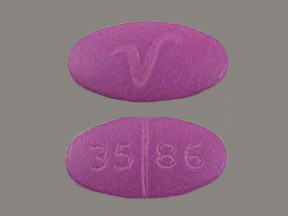HYDROCODONE/IBUPROFEN - ORAL
PHONETIC PRONUNCIATION: (HYE-droe-KOE-done/EYE-bue-proe-fen)
COMMON BRAND NAME(S): Vicoprofen
GENERIC NAME(S): hydrocodone/ibuprofen
Uses
USES: This combination medication is used for a short time (usually less than 10 days) to help relieve moderate to severe pain. It contains an opioid (narcotic) pain reliever (hydrocodone) and a nonsteroidal anti-inflammatory drug-NSAID (ibuprofen). Hydrocodone works in the brain to change how your body feels and responds to pain. Ibuprofen reduces pain and fever. This product is not recommended for use in children younger than 6 years due to an increased risk of serious side effects (such as slow/shallow breathing). This medication is not intended to treat long-term conditions (such as arthritis).
How to use HYDROCODONE/IBUPROFEN - ORAL
HOW TO USE: Read the Medication Guide provided by your pharmacist before you start using this medication and each time you get a refill. If you have any questions, ask your doctor or pharmacist. Take this medication by mouth as directed by your doctor, usually every 4 to 6 hours as needed. Take it with a full glass of water (8 ounces or 240 milliliters) unless your doctor directs you otherwise. Do not lie down for at least 10 minutes after taking this drug. You may take this drug with or without food. If you have nausea, it may help to take this drug with food. Ask your doctor or pharmacist about other ways to decrease nausea (such as lying down for 1 to 2 hours with as little head movement as possible). The dosage is based on your medical condition and response to treatment. To reduce your risk of stomach bleeding and other side effects, take this medication at the lowest effective dose for the shortest possible time. Do not increase your dose, take the medication more frequently, or take it for a longer time than prescribed. Properly stop the medication when so directed. The manufacturer recommends you take no more than 5 tablets in a 24-hour period. Pain medications work best if they are used as the first signs of pain occur. If you wait until the pain has worsened, the medication may not work as well. Also follow your doctor's or pharmacist's directions for the safe use of other non-narcotic pain relievers (such as acetaminophen). This medication may cause withdrawal reactions, especially if it has been used regularly for a long time or in high doses. In such cases, withdrawal symptoms (such as restlessness, watering eyes, runny nose, nausea, sweating, muscle aches) may occur if you suddenly stop using this medication. To prevent withdrawal reactions, your doctor may reduce your dose gradually. Ask your doctor or pharmacist for more details, and report any withdrawal reactions right away. When this medication is used for a long time, it may not work as well. Talk with your doctor if this medication stops working well. Though it helps many people, this medication may sometimes cause addiction. This risk may be higher if you have a substance use disorder (such as overuse of or addiction to drugs/alcohol). Take this medication exactly as prescribed to lower the risk of addiction. Ask your doctor or pharmacist for more details. Tell your doctor if your pain persists or worsens.
Side Effects
Precautions
Interactions
Overdose
Images

- color
- white
- shape
- oblong
- imprint
- IP 146
Reviews
Faq for HYDROCODONE/IBUPROFEN - ORAL
Hydrocodone/ibuprofen is a combination medication used to relieve moderate to severe pain.
Hydrocodone is an opioid pain reliever, while ibuprofen is a nonsteroidal anti-inflammatory drug (NSAID). Together, they provide pain relief by blocking the pain signals and reducing inflammation.
Common side effects may include drowsiness, dizziness, nausea, vomiting, constipation, and stomach upset. It is important to consult a healthcare professional for a complete list of possible side effects.
Yes, hydrocodone is a controlled substance and can lead to addiction or dependence if used improperly or for a prolonged period. It is essential to follow the prescribed dosage and duration provided by your healthcare provider.
Before using hydrocodone/ibuprofen, inform your healthcare provider about any allergies, medical conditions, or medications you are currently taking. It is important to disclose any history of substance abuse or addiction.
Yes, hydrocodone/ibuprofen may interact with certain medications, including but not limited to antidepressants, sedatives, muscle relaxants, and other opioids. It is crucial to inform your healthcare provider about all the medications you are taking to avoid potentially harmful drug interactions.
Follow the instructions provided by your healthcare provider. Hydrocodone/ibuprofen is usually taken by mouth with or without food. Do not exceed the prescribed dosage or duration of use.
Hydrocodone/ibuprofen is not recommended during pregnancy, especially in the third trimester. It may also pass into breast milk and harm a nursing baby. Consult your healthcare provider for alternative pain relief options if you are pregnant or breastfeeding.
If you miss a dose, take it as soon as you remember. However, if it is close to the time for your next scheduled dose, skip the missed dose and continue with your regular dosing schedule. Do not take a double dose to make up for a missed one.
Warning
WARNING: Hydrocodone/ibuprofen has a risk for abuse and addiction, which can lead to overdose and death. Hydrocodone/ibuprofen may also cause severe, possibly fatal, breathing problems. To lower your risk, your doctor should have you take the smallest dose of hydrocodone/ibuprofen that works, and take it for the shortest possible time. See also How to Use section for more information about addiction. The risk for severe breathing problems is higher when you start this medication and after a dose increase, or if you take the wrong dose/strength. Taking this medication with alcohol or other drugs that can cause drowsiness or breathing problems may cause very serious side effects, including death. Also, other medications can affect the removal of hydrocodone/ibuprofen from your body, which may affect how hydrocodone/ibuprofen works. Be sure you know how to take hydrocodone/ibuprofen and what other drugs you should avoid taking with it. See also Drug Interactions section. Get medical help right away if any of these very serious side effects occur: slow/shallow breathing, unusual lightheadedness, severe drowsiness/dizziness, difficulty waking up. Keep this medicine in a safe place to prevent theft, misuse, or abuse. If someone accidentally swallows this drug, get medical help right away. The other ingredient in this medication, ibuprofen, may rarely cause serious (rarely fatal) bleeding from the stomach or intestines. Also, nonsteroidal anti-inflammatory drugs (including ibuprofen) may rarely increase the risk for a heart attack or stroke. This effect can happen at any time while taking this drug but is more likely if you take it for a long time. The risk may be greater if you have heart disease or increased risk for heart disease (for example, due to smoking, family history of heart disease, or conditions such as high blood pressure or diabetes). Do not take this drug right before or after heart bypass surgery (CABG). Talk to your doctor or pharmacist about the benefits and risks of treatment, as well as other possible medication choices. Stop taking this medication and get medical help right away if you notice any of the following rare but very serious side effects: chest pain, severe dizziness, weakness on one side of the body, vision changes, slurred speech, black stools, persistent stomach/abdominal pain, vomit that looks like coffee grounds. (See also Precautions section.) Before using this medication, women of childbearing age should talk with their doctor(s) about the risks and benefits (such as miscarriage, trouble getting pregnant). Tell your doctor if you are pregnant or if you plan to become pregnant. During pregnancy, this medication should be used only when clearly needed. It is not recommended for use during the first and last trimesters of pregnancy due to possible harm to the unborn baby and interference with normal labor/delivery. If this medication must be used, to lessen the risk, take the smallest effective dose for the shortest possible time. Babies born to mothers who use this drug for a long time may develop severe (possibly fatal) withdrawal symptoms. Tell the doctor right away if you notice any symptoms in your newborn baby such as crying that doesn't stop, slow/shallow breathing, irritability, shaking, vomiting, diarrhea, poor feeding, or difficulty gaining weight.
Disclaimer
IMPORTANT: HOW TO USE THIS INFORMATION: This is a summary and does NOT have all possible information about this product. This information does not assure that this product is safe, effective, or appropriate for you. This information is not individual medical advice and does not substitute for the advice of your health care professional. Always ask your health care professional for complete information about this product and your specific health needs.





No Reviews Yet